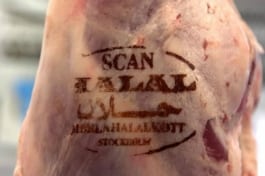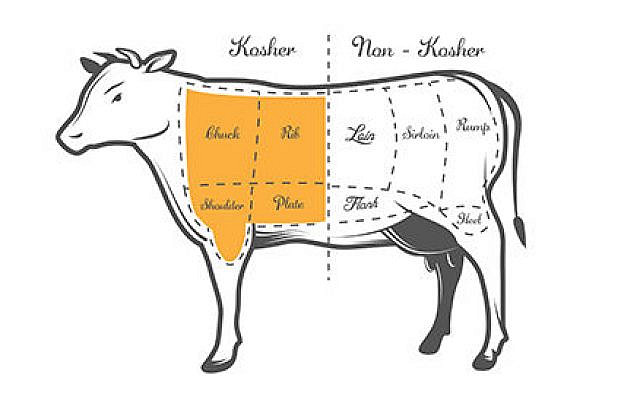With the debate on stun or non-stun slaughter still raging, Oli Haenlein examines the different arguments on how meat should be labelled, given slaughter and other welfare factors.
 Halal meat exploded into the public consciousness earlier this year, after the papers, most notably The Daily Mail and The Sun, gleefully ranted and raved about it being “secretly” sold on a major scale in many of our favourite supermarkets and restaurants.
Halal meat exploded into the public consciousness earlier this year, after the papers, most notably The Daily Mail and The Sun, gleefully ranted and raved about it being “secretly” sold on a major scale in many of our favourite supermarkets and restaurants.
Pizza Express, Subway, Sainsbury’s, Tesco, Waitrose and Marks & Spencer were all pulled up by the tabloids for a lack of transparency over the selling of ritually slaughtered meat. One could debate the motives of these stories, and to what extent these were even news stories, since the subject has been dealt with repeatedly in the past. Regardless, they caused a stir, and put the subject of labelling under the spotlight.
‘Hysteria’
Large amounts of halal-slaughtered New Zealand lamb is being sold on UK shelves, but industry figures dismissed the uproar as sensationalist. Craig Finch, Beef + Lamb New Zealand regional manager, tells MTJ: “All our halal meat is processed to the same standards as non-halal meat. All of our animals must be stunned prior to slaughter – the only difference is we have Muslim slaughtermen who say a quick prayer. The processes are absolutely identical. There is also no difference in animal welfare.”
Meanwhile, the Halal Food Foundation dismisses the “hysteria”, saying it is heavily concerned with animal welfare, and highlights that the RSPCA estimates that 88% of halal meat in the UK is stunned, and therefore no different to non-halal slaughter in terms of welfare.
However, the government has been called on by some quarters to make halal labelling compulsory, and the issue was debated in parliament, as well as by Islamic and Jewish faith leaders, by welfare groups, and even on LBC radio by Nick Clegg.
The aforementioned faith leaders, Henry Grunwald of Shechita UK, and Dr Shuja Shafi of the Muslim Council of Britain, wrote to The Telegraph in support of clear labelling: “Comprehensive labelling should be supported by faith communities and animal welfare groups alike. It would offer all consumers genuine choice, whether they are motivated by animal welfare, religious observance, or even intolerance of anyone who looks or worships differently to them.”
The Sharia Halal Board, one of a number of UK certifiers agrees. Senior consultant Saraj Murtaza says: “All halal meat should definitely be labelled as halal. This should also be clearly visible. This is imperative for Muslims and non-Muslims alike; it allows Muslims to know the meat they are purchasing is in fact halal and, equally, allows non-Muslims to have to the choice of purchasing halal or non-halal.”
However, Downing Street has said it believes transparency can be achieved without a compulsory labelling scheme, while MPs have rejected a proposal to amend the Consumer Rights Bill to force halal meat products to be clearly labelled.
Europe
While those in the UK consider their stance on the subject, the European Commission is researching labelling with regard to animal welfare, and the UK government could introduce some sort of compulsory labelling if the research supports such a move.
Defra has said it will wait until the research is finalised before drawing any conclusions. A spokesperson says: “We want people to have the information they need to make informed choices about the food they buy. In the first instance that is for the retailer or the food outlet to provide. We have contributed to the EU on their study into compulsory labelling of meat and will review options for the UK once it is finalised this summer.”
The EU study is on information for consumers on the stunning of animals, and is due for publication in the second half of 2014. A European Commission spokesperson says: “In the light of the study, the Commission will consider if further actions are necessary while further discussions are held with member states, MEPs, stakeholders etc. In any case, a proper balance between information to consumers and respecting freedom of religion will have to be found.”
The study is the result of a request by the European Parliament during the negotiations of Regulation (EC) No 1169/2011 on food information to consumers. Amendments to impose labelling of meat from animals slaughtered without stunning were rejected by the Commission, but the current study was born out of the debate.
Welfare not religious belief
Welfare and veterinary groups say the issue should not be religious. Halal meat can be both stun and non-stun, and the RSPCA, which disagrees with non-stun slaughter, believes labelling should concentrate on this: “Scientific research has clearly shown that slaughter of an animal without stunning can cause unnecessary suffering. The RSPCA is calling for labelling to refer to stun or non-stun slaughter [rather than a method of ‘religious’ slaughter] so shoppers can make an informed choice. Our concern has nothing to do with the expression of religious belief but with the practice of killing by throat cutting without pre-stunning.”
The British Veterinary Association (BVA) has joined the RSPCA’s calls and goes a step further by stating that not only would halal labelling not have an impact on animal welfare, as it won’t have indications over whether the animals been stunned or not, “but could fuel prejudice”. BVA president and veterinary surgeon Robin Hargreaves says: “It is very disappointing that so much confusion remains over the issue of labelling. Calls for products to be labelled as halal or kosher will do nothing to help consumers who want to make a pro-animal welfare choice. This important animal welfare issue must not be hijacked by other agendas.”
The British Retail Consortium (BRC) also believes it is important for non-stun meat to be highlighted, as opposed to basic labelling of halal products. Andrew Opie, director of food and sustainability, says: “We support the views of other groups that the focus should be on animal welfare, explicitly if the animal has been stunned or not. If the government does decide labelling is appropriate, we believe that should apply only to meat from animals that are not stunned.”
‘Holistic’ welfare labelling
A growing view from the halal sector is that if meat must be labelled stun or non-stun, then not only should other slaugher methods be labelled, but the consumer should be informed of other welfare issues too.
Rizvan Khalid, executive director of halal supplier Euro Quality Lambs, says: “If they go down the compulsory labelling road, it should be an all-encompassing holistic welfare label. For labels to be restricted to stun and non-stun is not objective – it needs to cover transportation, on-farm production and other issues, not just one step in the supply chain.”
Khalid tells MTJ there are a number of other areas, including tail docking and castration, that are involved in meat production that are just as significant in the animal welfare debate, claiming that practical experience shows ear-tagging can cause more pain than actual slaughter. He adds: “Slaughter is more emotional for people because of the blood and the animal convulsing, but if we say welfare labelling is compulsory, it needs to be for the whole life of the animal.”
Khalid points to the American Global Animal Partnership as a positive system, in which labels show an animal welfare rating that is decided upon by a number of whole-life criteria, which cover issues such as outdoor access.
Naved Syed, halal adviser to the Yorkshire Asian Business Assication (YABA), tells MTJ he believes the Muslim community is being victimised in the labelling debate, and agrees that other issues should be covered if compulsory labelling is brought in. He says: “The problem is that they only want to label halal products. If they want to label halal products as stun or non-stun, they should label all the processing methods, such as gassing, captive bolt and electrical. The consumer has a right to know and a right to choose, but Muslims are complaining because it’s just about them. All it’s doing is picking on the Muslim community.”
In a letter to MP Neil Parish, chairman of the Associate Parliamentary Group for Animal Welfare, Syed submitted 10 points of cruelty that he believes are worse but routinely ignored, thus making accusations of double standards. These include castration, tagging, laboratory use, dehorning, battery cages and farrowing. He accuses Parish of “continually attacking the slaughter methods of the Muslim and Jewish communities with little or no basis”. The letter also reads: “As you have mentioned animal welfare as your main concern, then why start at the end of the chain and worry about the last five seconds of its life when there is more cruelty in handling of animals and transport, yet that is being ignored.
“There are far more important issues on animal welfare and cruelty that are being ignored for cheap headlines and political gain. If they were really concerned about animal welfare they should address the following 10 areas, which highlight blatant cruelty perpetrated on animals in the UK.” As Parish is a supporter of fox hunting, Syed also accuses him of hypocrisy for opposing non-stun slaughter.
Animal welfare groups have also called for a wider system that takes into account the full supply chain. The BVA wants “one clear EU-wide welfare label that takes into account the whole-life welfare of food animals including the production system, method of transport”, as well as whether the animal was stunned before slaughter or not.
Self-certification
Zena Butt, from the Halal Food Authority (HFA), also expresses concerns over compulsory halal labelling. In an article for the Eastern Eye, she says that labelling laws would put the onus on retailers, resulting in an increase in self-certification, which might not be comprehensive: “If it is the responsibility of the retailer to label a product ‘halal’, as has been suggested by the government, the said retailer needs to understand that there are numerous issues that need to be taken into account, checked, monitored and regulated.
“Though the meat may be from a halal source, has the entire production process been halal approved? Is the said product free of all non-halal additives and E-numbers? Is it free of non-halal oils and fats? Are the emulsifiers that have been used 100% sourced from halal slaughtered animals? If yeast has been used in the finished product, was it autolysed or brewer’s yeast? If cheese has been used in a product, is animal rennet or pepsin used in the cheese production?
“These are just a few of the questions that need to be considered to ensure a product is 100% halal and consumers cannot guarantee that a product is halal if it has not been accredited by an independent, reputable certification body that vigorously checks every single ingredient.”
The HFA says that to avoid self-certification, “it needs to be defined and regulated under UK laws if labelling is to become common practice; this will also ensure that consumers are protected from potential mislabelling and/or misrepresentation.
“Until the above occurs, the HFA believes that labelling meat ‘stunned’ or ‘non-stunned’ will be sufficient and we wholeheartedly support this concept as this will satisfy the animal welfare concerns of all and sundry, as well as allowing UK consumers to execute informed decisions in regards to the meat they are consuming and the products that they are buying.”
MTJ readers have spoken
There seems to be plenty of scepticism towards compulsory halal labelling, with many calling for labelling to concentrate on the stun/non-stun issue. However MTJ asked you, our readers, for your views on the subject by putting a poll on our website – meatinfo.co.uk. The results showed that 76% thought all halal meat products be labelled as such. Just 19% thought that it was more important to know if it had been stunned or not, while 6% voted that halal meat shouldn’t be labelled as such.
Counterproductive
One concern over halal labelling is that it could actually increase demand for the non-stun slaughter that welfare campaigners criticise. Naved Syed tells MTJ: “Non-stun labelling would destroy the stun industry. Given the choice, Muslims will pick non-stunned meat. If it says it is stunned on the label, people won’t pick it up.”
Rizvan Khalid agrees, pointing to Eblex research that shows that most halal consumers believe stunned meat is haram, or forbidden, with non-stun being regarded as the correct method of Islamic slaughter. He says this means most Muslims will avoid stunned meat if it is labelled, with negative consequences for the industry: “Those who stun will not be able to compete and you will get a polarisation of the market. This will cause shortages and surpluses and prices will go up for everyone.”



